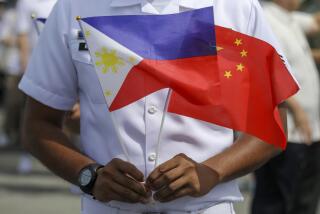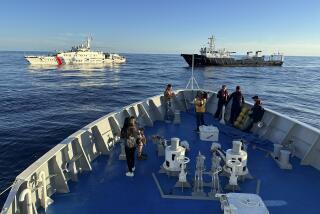When We Linger, Things Turn Sour
- Share via
A century ago, America faced in the Philippines a situation similar to what we now face in Afghanistan. Indeed, while the Philippines is an ally today in the anti-terror war, a look backward to a bloody early chapter of that Pacific nation offers lessons for Central Asia.
Philippines President Gloria Macapagal Arroyo met with President Bush in Washington last week. Citing the 50th anniversary of the two countries’ mutual defense treaty, Arroyo asked for and received $92million in military aid to suppress a Muslim separatist-terrorist movement in the southern part of her nation. And Newsweek magazine reports that the Pentagon might make the Philippines its next target, after Afghanistan, in the worldwide war on terror.
Not many Americans may know it, but the mostly Catholic Philippines has a substantial Muslim minority, which long has been in league with the Al Qaeda terror network.
Ramzi Yousef, convicted in the 1993 attack on the World Trade Center, operated out of the Philippines as he schemed to blow up U.S. airliners; he is now imprisoned in the U.S. In May, Muslim rebels in the Philippines beheaded one American and kidnapped two others, who are still being held hostage. Indeed, even as Arroyo arrived in Washington, fighting back home erupted yet again, killing at least 100 people.
The intertwined history of the U.S. and the Philippines traces back to the Spanish-American War; on May 1, 1898, Adm. George Dewey’s squadron smashed the Spanish fleet at the Battle of Manila Bay.
Filipino nationalist Emilio Aguinaldo declared an independent republic the following month, but the American plan for the archipelago was annexation, not liberation. And so the United States, having won an easy “symmetrical” victory against another Western power in a matter of months, now found itself in a difficult “asymmetrical” conflict in the Third World that lasted four years.
That anti-guerrilla war required some 70,000 American soldiers, who were both brutal and brutalized by the fighting. One trooper’s ditty referred to the Filipino insurgents and the Krag-Jorgensen rifle that Army men were issued: “Underneath the starry flag/Civilize them with a Krag.”
Defending U.S. involvement, President Theodore Roosevelt said the U.S. had “put up its flag in those islands, and the flag will stay there.” It was a costly declaration. Whereas 385 Americans were killed in combat defeating Spain, 4,234 American military personnel died putting down the insurrectos. As many as 200,000 Filipinos lost their lives before the fighting stopped in 1903.
Yet all of Roosevelt’s bully bravado--and all of that bloodshed--accomplished nothing permanent; the Philippines finally gained its independence in 1946. And it took years thereafter for U.S.-Philippines relations to normalize. A mutual defense treaty was signed in 1951, and today, the two nations are allied against Muslim terror.
The point here is not to lay blame on the U.S. for events of a century ago, but rather to underscore the difficulty that Washington always has faced in directly administering distant territory. The U.S. has an interest in squashing Al Qaeda and its allies anywhere and everywhere, but surely it’s preferable to let local proxies do the pacifying and, if necessary, the fighting. That is happening in the Philippines today, and it seems to be working. And that’s what needs to happen in Afghanistan, because if the U.S. walks a high profile, the welcoming crowds in Kabul quickly could turn sour.
So far, apparently, the Pentagon has suffered just a handful of casualties in Afghanistan. Indeed, it’s more dangerous to be a police officer in the U.S.; approximately a dozen a month are killed here.
Internationally, here’s the moral of the story: Only the U.S. can pulverize a terror regime such as the Taliban. But if American soldiers get stuck policing the Afghan beat, then American lives will be lost, many more Americans will be brutalized, and the cause for which they all fought could yet turn into bitter fruit.
More to Read
Sign up for Essential California
The most important California stories and recommendations in your inbox every morning.
You may occasionally receive promotional content from the Los Angeles Times.













